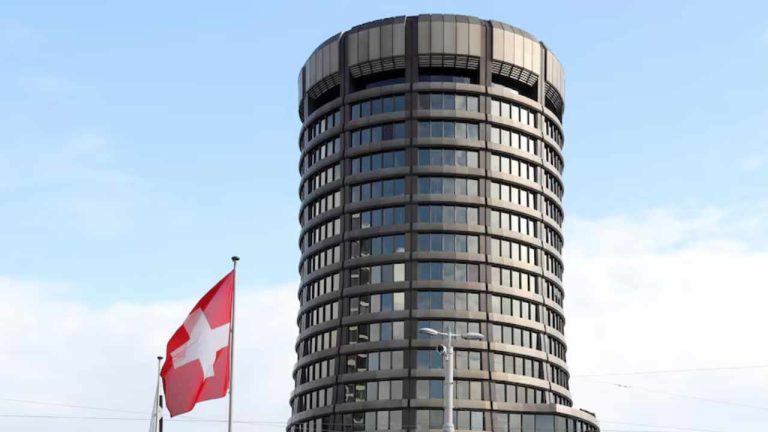 The BIS announced it was abandoning Mbridge, a project aimed at using CBDCs to interconnect the financial systems of several countries, due to its potential to help BRICS nations sidestep economic sanctions. BIS Abandons Mbridge Project for Potential BRICS Sanctions-Evading Applications The Bank for International Settlements (BIS) has finally decided to abandon its participation in […]
The BIS announced it was abandoning Mbridge, a project aimed at using CBDCs to interconnect the financial systems of several countries, due to its potential to help BRICS nations sidestep economic sanctions. BIS Abandons Mbridge Project for Potential BRICS Sanctions-Evading Applications The Bank for International Settlements (BIS) has finally decided to abandon its participation in […] While conversations about ending the CBDC-enabled international settlements project have focused on its links to BRICS, Mbridge has already reached the MVP stage, and members could choose to continue it without support from the BIS. BIS Considers Ending Mbridge Project, BRICS Countries Could Use It for Circumventing Sanctions The Bank for International Settlements (BIS) is […]
While conversations about ending the CBDC-enabled international settlements project have focused on its links to BRICS, Mbridge has already reached the MVP stage, and members could choose to continue it without support from the BIS. BIS Considers Ending Mbridge Project, BRICS Countries Could Use It for Circumventing Sanctions The Bank for International Settlements (BIS) is […]

The Bank for International Settlements and the Financial Stability Board have similar views on tokenization — it could provide new benefits and familiar challenges.
The Bank for International Settlements (BIS) and the Financial Stability Board (FSB) have both released a series of papers ahead of the Group of 20 (G20) Finance Ministers and Central Bank Governors meeting on Oct. 23 and 24.
Brazil is the president of the G20 world’s largest economies for 2024 and, like India last year, it called for a discussion of digital currency.
Both the BIS and FSB released papers on tokenization on Oct. 22. Although their studies were carried out independently, the BIS and FSB emphasized common themes.

The large private companies will work with seven central banks on improving structural inefficiencies in international transfers.
The Bank for International Settlements’ (BIS’) Project Agora has progressed to the design stage with the onboarding of 41 private financial firms. The project, launched in April by the BIS and seven central banks, is looking at how tokenized commercial bank deposits can be integrated with tokenized wholesale central bank digital currencies (CBDCs) on a single platform.
The regulated private-sector participants include Visa and Mastercard, SWIFT, the Swiss SIX Digital Exchange, Japan’s Monex Group financial services firm, clearing companies and a host of large banks. The Institute of International Finance, a financial services trade group, was chosen to convene the private participants, which responded to a call for participation issued in May.
Project Agora is now the largest BIS project in terms of participants. The private-sector members join the Bank of France (representing the Eurosystem), Bank of Japan, Bank of Korea, Bank of Mexico, Swiss National Bank, Bank of England and the Federal Reserve Bank of New York.
 The Bank for International Settlements (BIS) Annual Economic Report 2024, published on June 30, highlights the significant risks posed by rising public debt levels across both advanced and emerging market economies. The report stresses that without fiscal consolidation, debt trajectories will remain unsustainable, threatening macroeconomic stability. As interest rates rise, refinancing needs and higher debt […]
The Bank for International Settlements (BIS) Annual Economic Report 2024, published on June 30, highlights the significant risks posed by rising public debt levels across both advanced and emerging market economies. The report stresses that without fiscal consolidation, debt trajectories will remain unsustainable, threatening macroeconomic stability. As interest rates rise, refinancing needs and higher debt […] The latest Bank for International Settlements (BIS) survey reveals that 94% of central banks are exploring central bank digital currencies (CBDCs). There has been a notable increase in wholesale CBDC experiments, especially in advanced economies. Central banks are examining various factors for retail CBDCs, including holding limits and offline functionality. 94% of Surveyed Central Banks […]
The latest Bank for International Settlements (BIS) survey reveals that 94% of central banks are exploring central bank digital currencies (CBDCs). There has been a notable increase in wholesale CBDC experiments, especially in advanced economies. Central banks are examining various factors for retail CBDCs, including holding limits and offline functionality. 94% of Surveyed Central Banks […] Project Mbridge, the cross-border central bank digital currency (CBDC) project that seeks to integrate several currencies into a global network, has reached its minimum viable product stage. This means that each one of the participant central banks has deployed a validating node in the network, that is ready to perform real-value transactions CBDC Project Mbridge […]
Project Mbridge, the cross-border central bank digital currency (CBDC) project that seeks to integrate several currencies into a global network, has reached its minimum viable product stage. This means that each one of the participant central banks has deployed a validating node in the network, that is ready to perform real-value transactions CBDC Project Mbridge […] BIS Head Agustin Carstens and Infosys co-founder Nandan Nilekani have proposed the idea of the “Finternet,” an interconnected financial system led by tokenized assets that would help to overcome today’s shortcomings in transacting financial assets. The core of this system would rely on the possibility of smart contracts managing these assets programmatically. BIS Boss Highlights […]
BIS Head Agustin Carstens and Infosys co-founder Nandan Nilekani have proposed the idea of the “Finternet,” an interconnected financial system led by tokenized assets that would help to overcome today’s shortcomings in transacting financial assets. The core of this system would rely on the possibility of smart contracts managing these assets programmatically. BIS Boss Highlights […] The Bank for International Settlements, the central banks’ bank, announced the launch of Project Agorá, a joint private-public initiative seeking to examine the potential benefits of tokenization for improving cross-border settlements. Agorá includes the participation of seven central banks and private institutions to be convened by the Institute of International Finance (IIF). BIS to Explore […]
The Bank for International Settlements, the central banks’ bank, announced the launch of Project Agorá, a joint private-public initiative seeking to examine the potential benefits of tokenization for improving cross-border settlements. Agorá includes the participation of seven central banks and private institutions to be convened by the Institute of International Finance (IIF). BIS to Explore […]

Should longer-term assets be allowed as reserve assets, the committee believes these must overcollateralize the claims of stablecoin holders.
The Basel Committee on Banking Supervision of the Bank for International Settlements (BIS) proposed several measures on targeted adjustment to its standard on banks’ exposure to cryptoassets. A consultative document was published on the BIS website on Dec. 14.
The document is the result of the review work conducted during 2023, which helped the committee formulate amendments to its original prudential standards for banks’ exposure to stablecoins, published in December 2022.
Proposed changes relate primarily to the composition of the reserve assets of stablecoins, specifically for crypto assets, classified under Group 1b in the prudential standards, “subject to capital requirements based on the risk weights of underlying exposures.”